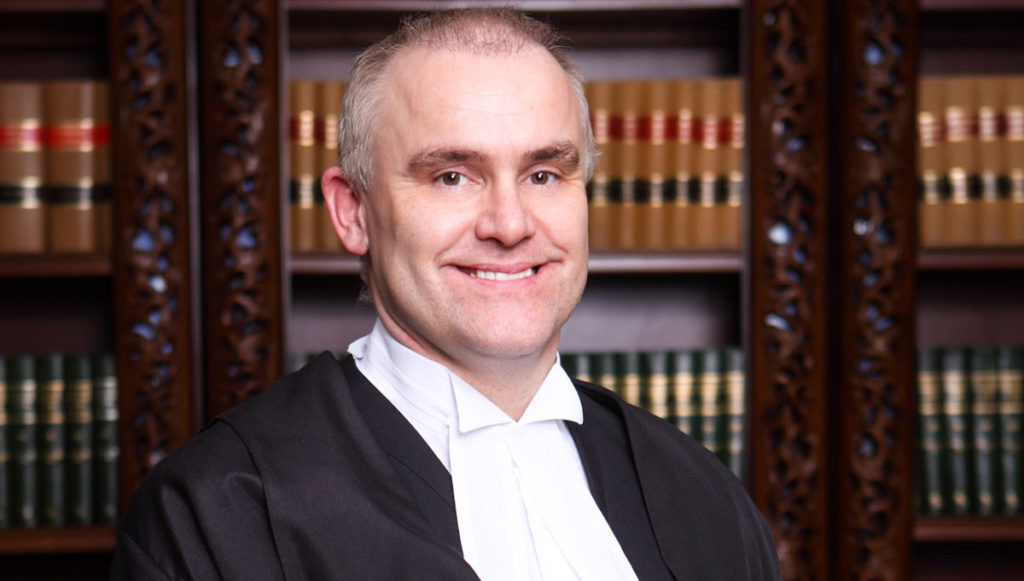- Rail blockade illustrates the ambiguity of legal rights - March 4, 2020
- ‘Colonial policing’ in Indigenous communities a complex issue: Grey - February 3, 2020
- Supreme Court of Canada decision is a call to action for the Crown: Grey - January 15, 2020
Alberta Indigenous rights litigator Leighton Grey’s wide-ranging practice provides him with an extremely varied client base.
Grey, a senior partner with Grey Wowk Spencer LLP, acts for people with problems in the areas of criminal law, child welfare proceedings, personal injury and other forms of civil litigation. But he says they all have at least one thing in common.
“They’re underdogs,” Grey says. “My clients are not billionaires, they are everyday people. Many of them are Indigenous First Nations people, people on legal aid or with low incomes. I deal with families and children who have been abused and neglected, and in criminal law, you’re always helping someone who’s subject to the power and wealth of the state.
“I’ve been doing this a long time, but I’ve always tried to be on the right side, fighting for the person with less status than they deserve,” he adds.
Grey says he developed his affinity for the underdog in part as a result of his own background.
“I grew up in north Edmonton, as part of a blue-collar family where nobody had ever gone to university,” he says.
In those younger days, Grey set his sights on a career in hockey, after emerging as a talented player, but eventually realized the value of an education and switched his primary focus to academics. In the late 1980s, he began his studies at the University of Alberta’s faculty of law but says the experience didn’t quite live up to his expectations.
“I had hoped that I’d be surrounded by smart, motivated people engaging in exciting and intellectually stimulating pursuits,” Grey says. “But at that time, I found many students were only focused on themselves and landing jobs at big firms.
“It was a bit like joining the marines — they were stripping away people’s ideas and replacing them with a different kind of thinking and problem-solving,” he adds.
Despite his disillusionment with school, Grey says the realities of the practice of law have more than made up for it.
“I’ve been a member of the bar for 25 years, and for almost all of that time, I’ve loved what I do,” he says.
Grey says his articling period with the Federal Department of Justice was a formative time for his practice but government work never quite cut it for him.
“It was a good place to start because you got to work with great lawyers on big cases,” he says. “But when you’re providing advice and services to government departments, what you miss out on is the day-to-day experience of actually working with and helping people.
“I left because I craved that one-on-one contact with real people, and it’s been the guiding principle of my work ever since,” Grey adds.
In the late 1990s, he embarked on a new practice area after his grandmother, a residential school survivor, asked him about the burgeoning class action against the federal government for its treatment of former students. Although he is a status Indian himself, Grey says he was caught off guard by her questions.
“I knew nothing about it, so I made it my business to find out,” he explains.
In the years since, Grey has acted for more than 200 clients in the Independent Assessment Process established under the Indian Residential Schools Settlement Agreement and is currently working on newer claims that allege Indigenous people received inadequate hospital care.
Away from the office, Grey says it was tough for him to abandon his ambition to become a professional hockey player, and he even took a brief break from practice after articling to play in minor leagues in the U.S.
“I’m very passionate about hockey,” he says.
And the sport still features strongly in Grey’s life, via his work as a youth skills coach and mentor. In addition, he and his wife Jennifer co-founded a skating instruction program, the Lakeland Sports and Learning Academy, which has graduated a number of players into some of the top junior leagues in the country.

